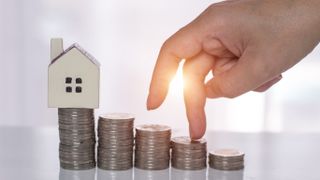Are you able to pay off your mortgage early?
The first thing you’ll need to consider is whether it’s actually feasible for you to pay off your mortgage early, both in terms of whether or not you have the cash to repay it, and if your mortgage lender (opens in new tab) will even allow you to pay it off ahead of schedule. You’ll need to contact your lender to see if early repayment is possible (some only allow you to make additional payments within certain limits), and if it is, whether you’ll be charged a prepayment penalty for doing so. These are becoming less common but you may be facing such a charge if you’ve got an older mortgage contract, in which case you’ll need to work out if the potential savings you’ll make by repaying your loan early will compensate for the additional charge. You also need to have accessible cash to pay off your mortgage, which may be in the form of an inheritance, savings or successful investments. However, as we’ll discuss below, it’s important to work out whether this money could be put to better use elsewhere before you sink all your savings into your home.
Benefits to paying off your mortgage early
One of the biggest pros to paying off your mortgage early is the amount of interest you’ll save over the life of the loan. This can be a significant sum, particularly if you’re repaying your mortgage several years ahead of schedule, which could see you save thousands of dollars in interest. You’ll also be able to eliminate monthly mortgage payments, which could go a long way to boosting your cash flow and household resources, leaving you an additional chunk of money that can be put towards saving, investing or simply enhancing your standard of living. Even if you don’t pay off the full amount in one go, you can still reap the rewards, particularly if you’re able to bring your level of equity above the magic 20% mark that will see your private mortgage insurance policy canceled (opens in new tab). There’s also the less tangible reason of simply being free of such a significant amount of debt and having the peace of mind that you own your home outright, which for those who have the means to do so, could be a key driver behind repaying a mortgage early.
Reasons you shouldn’t pay off your mortgage early
If you’re thinking of funneling every bit of spare cash you have into your home, it may be wise to reconsider. This is because your home is considered a non-liquid asset, and although that asset is substantial, it isn’t that easy to tap into the capital in a pinch. Instead, you’ll want to make sure that you’ve got a healthy emergency fund to hand that can provide a valuable financial buffer should you need it. You’ll want to make sure that your retirement savings are on track, too, as seeing property as a retirement fund can be a risky strategy should the market crash and leave you facing a loss (though bear in mind that your risk profile may change as you get closer to retirement, so make sure to seek suitable advice as to what might be the best course of action). Before paying off your mortgage, you’ll want to suitably fund any 401(k) plan and/or any personal individual retirement accounts, with the tax advantages of doing so only adding to the benefit of knowing your retirement needs are on track. Then there’s the fact that by repaying your mortgage early, you’ll lose the benefit of tax deductions when filing your tax return. Mortgage interest is tax deductible (opens in new tab) on any loan up to $750,000, which could have a significant impact on your bill as it lowers your taxable income; as such, repaying your mortgage could increase your tax bill and may impact the refund you’re entitled to, so it’s important to carefully consider the long-term consequences of early repayment.
Could the money be better spent elsewhere?
If you’ve got other debts that come with higher interest rates – credit cards (opens in new tab) being a prime contender here – it could be worth paying those off first (opens in new tab) before you tackle your mortgage. It’s also worth considering whether investing any spare money, rather than repaying the loan, could lead to a greater pay-off in the long run; given that mortgage rates are among the lowest they’ve ever been, there’s the potential to earn far more lucrative returns by investing on the stock market (opens in new tab), which could outweigh any savings made by slashing your mortgage interest payments.
Points to remember before paying off your mortgage
While repaying your mortgage may be the dream scenario, it may not be suitable for everyone. You’ll need to make sure that you don’t sink every last cent into it, thereby leaving you without suitable liquidity, and should work out the best use of your cash, particularly if you suddenly come into a windfall in the form of an inheritance (or similar). Opting for a refinance mortgage (opens in new tab) instead could be a suitable mid-way point, which can give you the benefit of reducing your monthly repayments and/or your mortgage term without leaving you mortgage-free altogether. That said, for those who have the means and for whom repaying won’t negatively impact their financial status elsewhere, repaying a mortgage could be a way to go. Just make sure to thoroughly crunch the numbers to ensure it fits in with your overriding goals.

